 |

Update
for Monday, 15 October 2001
OPENING CEREMONY:
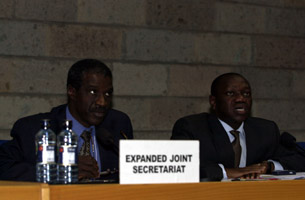 Sekou
Toure, Director of the Regional Office for Africa, opened the meeting and
welcomed Christina Boelcke, Head of the UNEP regional offices, who was
representing the UNEP Executive Director, and Oumar Aw, Head of the
Environment Unit of the African Development Bank and member of the Joint
Secretariat. He then invited the Government of Kenya, as the host to make
an opening statement. Sekou
Toure, Director of the Regional Office for Africa, opened the meeting and
welcomed Christina Boelcke, Head of the UNEP regional offices, who was
representing the UNEP Executive Director, and Oumar Aw, Head of the
Environment Unit of the African Development Bank and member of the Joint
Secretariat. He then invited the Government of Kenya, as the host to make
an opening statement.
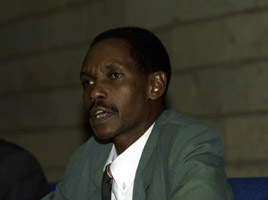 Welcoming
delegates, Simon Mbarire (right) from Kenya's Ministry of Environment
and Natural Resources congratulated the Expanded Joint Secretariat for
spearheading the African Preparatory process and the subregional
organizations and the Regional Office for Africa (ROA) for the preparatory
processes undertaken to date, and said Kenya will continue being
supportive of it. He noted the aims of the Summit and highlighted some of
the questions that would be under consideration, inter alia,
whether: governments had lived up to their commitments; there are
indicators to show any achievements towards sustainability; there were
lessons learned that have emerged that needed to be addressed within the
Agenda 21. Welcoming
delegates, Simon Mbarire (right) from Kenya's Ministry of Environment
and Natural Resources congratulated the Expanded Joint Secretariat for
spearheading the African Preparatory process and the subregional
organizations and the Regional Office for Africa (ROA) for the preparatory
processes undertaken to date, and said Kenya will continue being
supportive of it. He noted the aims of the Summit and highlighted some of
the questions that would be under consideration, inter alia,
whether: governments had lived up to their commitments; there are
indicators to show any achievements towards sustainability; there were
lessons learned that have emerged that needed to be addressed within the
Agenda 21.

|
|
|
|
|
|
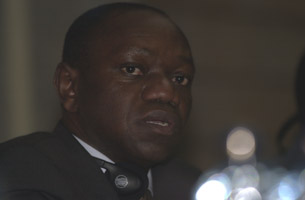 In
his opening remarks, Sekou Toure, on behalf of the UNEP Executive Director
and of the Expanded Joint Secretariat, noted that Africa has many stakes
in the 2002 Summit, particularly as it is hosting the Summit and the
effects of globalization, thus, the need to ensure Africa's contribution
to the Summit is effective and has an impact. In
his opening remarks, Sekou Toure, on behalf of the UNEP Executive Director
and of the Expanded Joint Secretariat, noted that Africa has many stakes
in the 2002 Summit, particularly as it is hosting the Summit and the
effects of globalization, thus, the need to ensure Africa's contribution
to the Summit is effective and has an impact.
 to
follow to
follow
|
|
|
|
|
|
ORGANIZATIONAL
MATTERS:
|
|
|
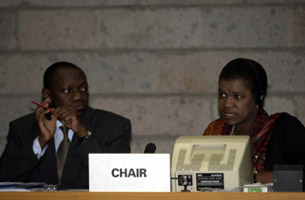 Sekou
Toure said that the following consultations, it had been decided that the
current chair of the Organization of African Unity should also serve as
the Chair of the African Preparatory Conference, and presented the
nomination of Zimbabwe, and Enes Chiyenge (Zambia) was elected Bureau
Chair by acclamation. Sekou
Toure said that the following consultations, it had been decided that the
current chair of the Organization of African Unity should also serve as
the Chair of the African Preparatory Conference, and presented the
nomination of Zimbabwe, and Enes Chiyenge (Zambia) was elected Bureau
Chair by acclamation.
|
|
|
In
her opening remarks, Chair Chiyenge emphasized the importance of the
meeting and called for delegates' support and guidance. She then
presented the proposed agenda of work.
 to
follow to
follow
|
|
|
|
|
|
ELECTION OF THE OTHER BUREAU MEMBERS:
|
|
|
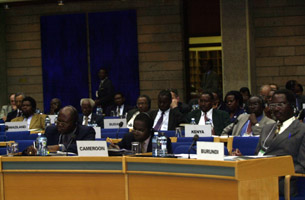
Chair Chiyenge suggested that the
bureau be constituted from among the African countries serving on the
Bureau of the World Summit on Sustainable Development, namely, Kenya,
Egypt, Nigeria and South Africa. Several countries noted the exclusion of
francophone country representation on the Bureau. Senegal suggested, and
delegates elected by acclamation, Cameroon (Mbasi Menye) to represent both
francophone and the central African sub-region. He also served as
rapporteur.
|
|
|
|
|
|
ADOPTION OF THE AGENDA:
|
|
|
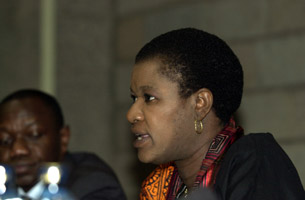 Presenting
the proposed agenda of work, Chair Chiyenge (right) said technical
segments would be held on Monday and Tuesday, 15-16 October and focus on
progress made in Africa since Rio, where delegates can draft and comment
on the ministerial statement of future needs and agenda-setting for
Johannesburg, which inform the ministerial meeting segment on Wednesday
and Thursday, 17-18 October. She reaffirmed that the goal of this
preparatory meeting is to agree upon an assessment and agenda-setting
report that, once finalized, will be sent to New York for integration into
preparations for Johannesburg. Presenting
the proposed agenda of work, Chair Chiyenge (right) said technical
segments would be held on Monday and Tuesday, 15-16 October and focus on
progress made in Africa since Rio, where delegates can draft and comment
on the ministerial statement of future needs and agenda-setting for
Johannesburg, which inform the ministerial meeting segment on Wednesday
and Thursday, 17-18 October. She reaffirmed that the goal of this
preparatory meeting is to agree upon an assessment and agenda-setting
report that, once finalized, will be sent to New York for integration into
preparations for Johannesburg.
|
|
|
|
|
|
PLENARY:
|
|
|

A
UNEP Consultant, S.K. Imbamba, presented the report, which was
prepared by the Expanded Joint Secretariat in cooperation with several
African regional organizations.
|
|
|
|
|
|
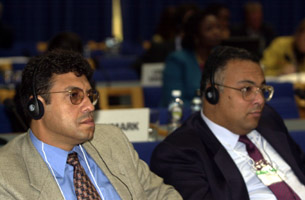
Egypt called for re-thinking the poverty/environment nexus and
prioritizing poverty eradication.
|
|
|
|
|
|
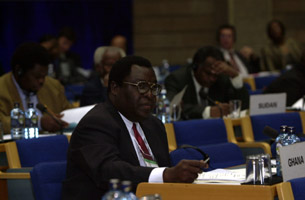 Ghana
supported innovative ways to reduce debt and mobilize resources for
sustainable development, calling for the report to mention FDI, science
and technology for sustainable development, and sustainable national human
settlement strategies. Ghana
supported innovative ways to reduce debt and mobilize resources for
sustainable development, calling for the report to mention FDI, science
and technology for sustainable development, and sustainable national human
settlement strategies.
|
|
|
|
|
|
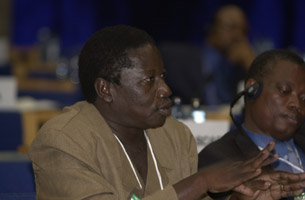
Burkina Faso called for a
re-emphasis on financial resources and transfer of technology, noted the
central role of Agenda 21 as a strategic framework, emphasized the need to
highlight progress made by Africa in regard to civil society participation
(CSO), and the need to set up follow-up mechanisms that enhance synergy
between the Conventions.
|
|
|
|
|
|
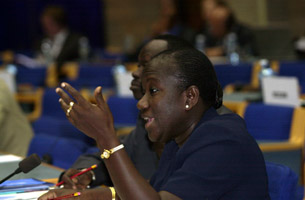
Senegal
urged promotion of a system of green accounting.
|
|
|
|
|
|
AFRICAN
MINISTERIAL STATEMENT:
|
|
|
S.K.
Imbamba also presented the Statement noting that it has three sections.
Regarding the preamble and general principles, he highlighted: a number of
principles, including the African Common Position; Africa's efforts and
contributions towards the implementation of Agenda 21; and the national,
subregional and regional preparations undertaken and their sponsors.
|
|
|
DRAFTING
COMMITTEE:
|
|
|
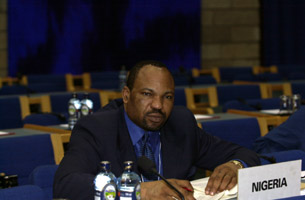
The
open-ended Drafting Committee, chaired by Osita (Nigeria), started work on the African ministerial statement on Monday
afternoon, 15 October.
|
|
|
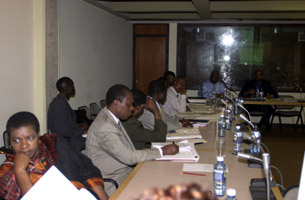
|
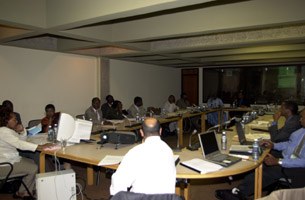
|
|
|
|
|
|
PICTURES FROM THE INDUSTRY FORUM:
|
|
|
|
|
|
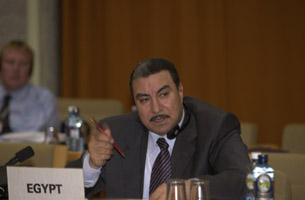
|
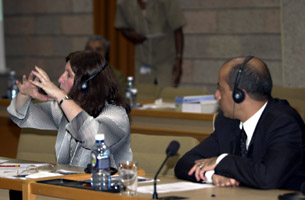
|
|
|
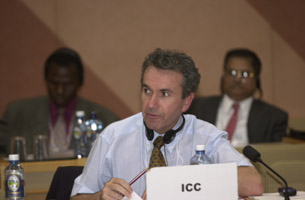
|
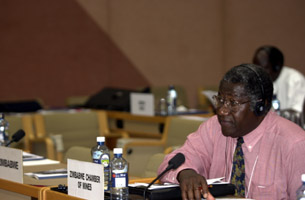
|
|
|
|
|
|
PICTURES FROM THE NGO FORUM:
|
|
|
|
|
|
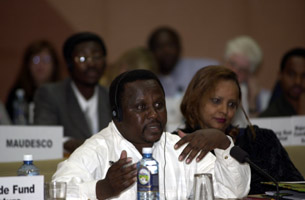
|
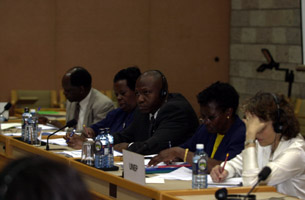
|
|
|
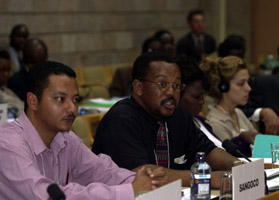
|
|
|
|
|
|
|
|
|
|
|
|
|
|
|